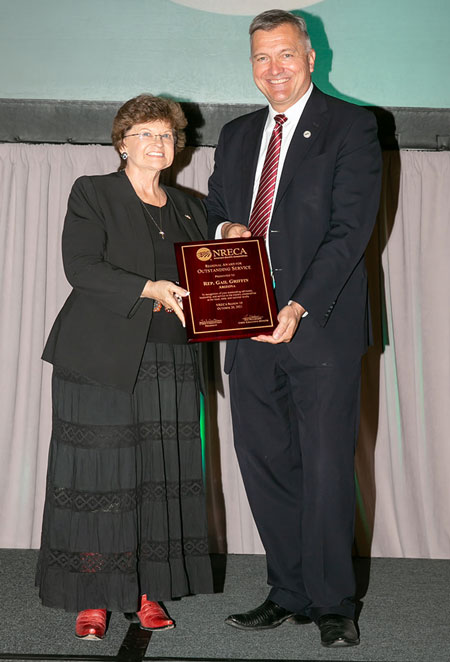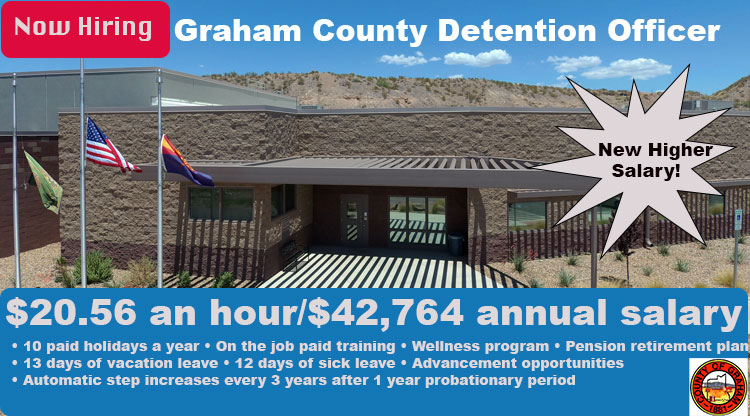File photo by Luke Runyon/KUNC: Water from the Central Arizona Project spills into rural Pinal County.
Column by Congressman Gail Griffin (R-LD19)
There has been a lot of talk lately about a local groundwater bill not being considered by the Arizona legislature.
Over the years, the proposed legislation has been called various names, including “Groundwater Conservation Areas,” “Special Management Areas,” “Rural Management Areas,” and “Rural Groundwater Management Areas.” It also includes a “Sustainable Groundwater Management Plan”.
Regardless of the name, the concept is the same and none of them are good.
The idea of ”local control” may sound good, but the actual provision is far from being local or voluntary.
Instead of requiring local votes by local residents, these bills would allow just two people in some counties to establish countywide irreversible groundwater management districts.
Legislators in these districts would be appointed by the governor rather than elected by the people.
Instead of requiring a unanimous vote of county supervisors to adopt the strictest sure water regulations in the nation, these bills require only a simple majority.
These bills would only allow designation of “parts” rather than applying equally to the entire basin. That is, individual lands may be selected for their water use, such as power plants, farms, mines, hydrogen production facilities, or any business. .
Instead of reducing the size of government, these bills created a new layer of government, giving additional taxing, zoning, planning and blaming powers to a handful of unelected and unaccountable bureaucrats. , determine the economy of a community and dictate what it can and cannot do. use your private property.
These bills would replace voluntary conservation requirements with mandatory reporting obligations, groundwater supplies, and groundwater withdrawal fees (taxes).
Instead of holding government officials accountable for public funds, these bills would allow state governors to donate up to $50 million annually to nonprofits and Indian tribes, regardless of geographic location, political ideology, or conflict of interest It becomes possible to
Instead of respecting their right to privacy, these bills would intrude into the private lives and affairs of people living in rural Arizona, including ranchers and farmers contesting water rights in the ongoing river rulings, and private wells. Requires the installation of active monitoring equipment in
Instead of authorizing temporary measures to restore aquifer health, these groundwater management districts will remain in perpetuity.
Instead of limiting absolute powers, these bills would effectively allow statutory control by setting “local control objectives” where non-elected members of the board could do whatever they wanted as a board. It is something to do.
Instead of mandating that water be used for ‘beneficial uses’, these bills open the door to a ‘water market’ where water can be turned into a ‘commodity’ that can be sold to the highest bidders, hoarded, and exported outside the district. will open. Large cities, environmental nonprofits, private companies.
Rather than narrowly tailoring government powers to prioritize human life and prosperity, these bills would broaden the Board’s definition of “secure water supply” and ensure that water is sufficient for 100 years of human activity. Not only would it allow us to have enough water to protect our endangered populations. Species, streams, rivers, fish and wildlife habitats are maintained for 100 years (or more). In other words, we cannot give people water. just for the environment.

All of this is full of abuse and unworkable in Arizona.
So “local control” (in this context) is a wolf in sheep’s clothing, aimed at deceiving voters into doing something different than what the bill actually does.
We must do all we can to identify bad laws before public hearings are held. And we must find solutions that are meaningful to Arizona and help strengthen the responsible use and management of water and natural resources.
We have solutions moving forward and will continue to seek additional solutions to help address Arizona’s rural groundwater problems.
As an elected official, I am committed to working with anyone willing to work with me and others to find reasonable solutions.
Until then, I will continue to fulfill my duty to the public to support good laws and oppose bad laws regarding local groundwater management in the state.
Gail Griffin is a Republican member of the Arizona House of Representatives serving in Legislative District 19, which includes the areas of Greenlee, Graham, Cochise, and Eastern Pima County. Mr. Griffin is chairman of the House Natural Resources, Energy and Water Committee and co-chair of the Joint Legislative Select Committee on Water Security.




















